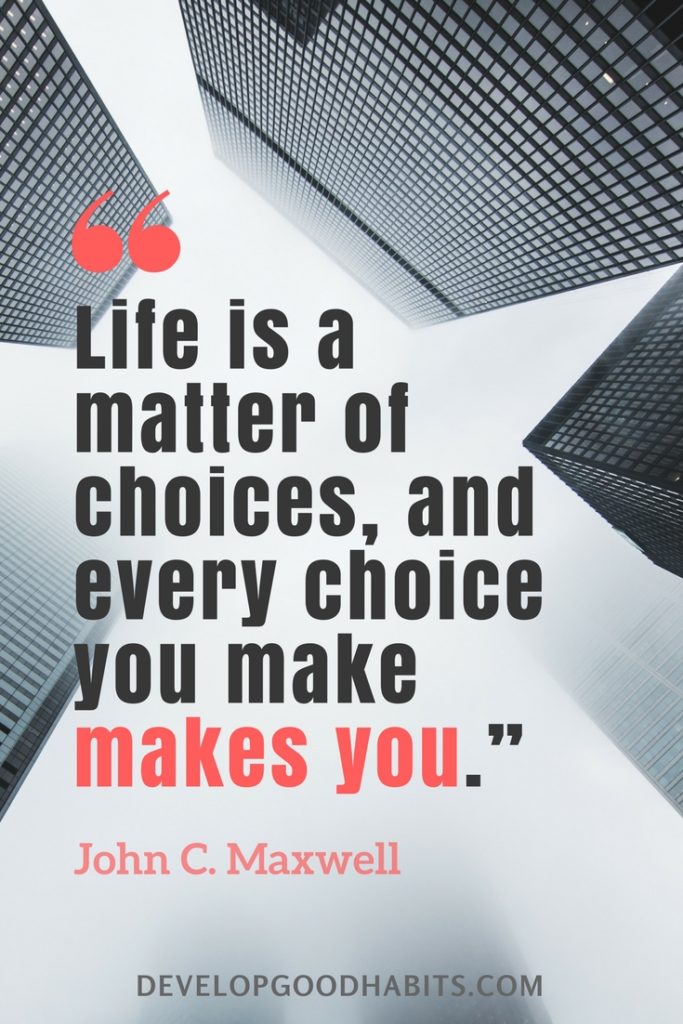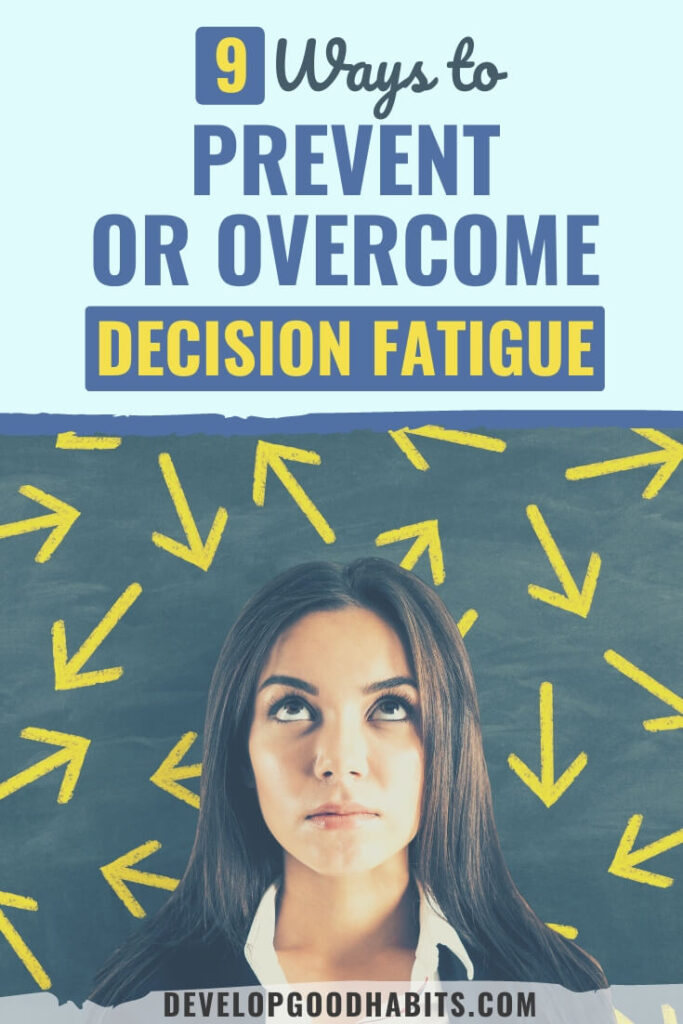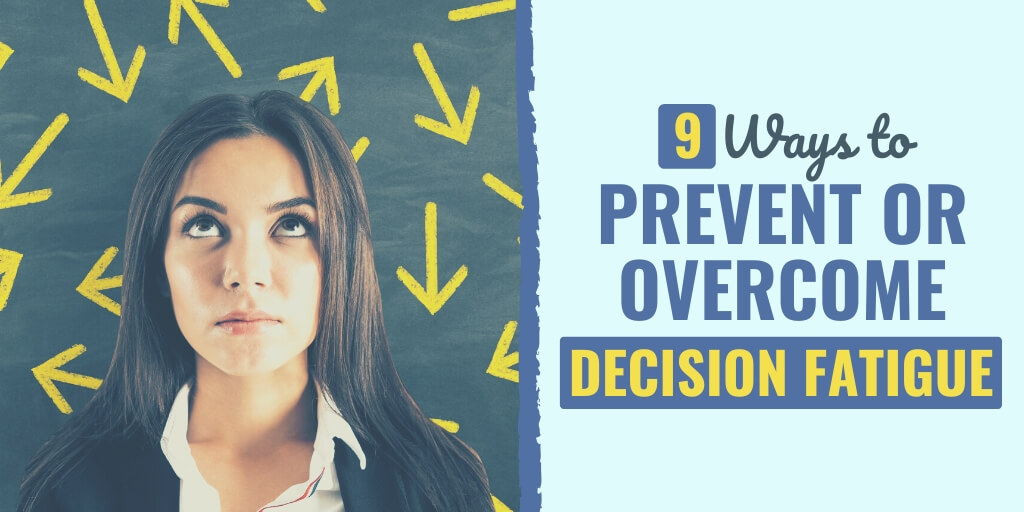There might be affiliate links on this page, which means we get a small commission of anything you buy. As an Amazon Associate we earn from qualifying purchases. Please do your own research before making any online purchase.
Imagine you are at the end of a hard exercise routine, and you can hardly push your body to do any more work. Your muscles are suffering from fatigue, and you are ready to give up. Your physical abilities have been depleted.
The same concept can be applied to your mental abilities!
Specifically, a concept called decision fatigue describes how people struggle with their choices after making too many decisions on a given day.
In this article, I will define decision fatigue and how it negatively impacts your ability to make smart choices, and then I will arm you with nine strategies you can use to prevent (or minimize) the negative aspects of this concept.
Before we get started, if you prefer to watch instead of read, check out the video version of this article on Youtube:
What Is Decision Fatigue?
Decision fatigue refers to the idea that your willpower or ability to make good choices deteriorates in quality after an extended period of decision making. Put simply: When you're forced to make hard decisions throughout the day, it's easy to make bad choices near the end.
Roy F. Baumeister, a social psychologist, known for a wide range of work on the self, sexuality and sex differences, social rejection, motivation, and aggression, coined the term decision fatigue in reference to the decline in the quality of decisions that a person makes after many decisions have been made in a row.
Understanding this concept can help you make positive changes to your lifestyle to save your mental energy and willpower for making the most important decisions.
Signs of Decision Fatigue
Some signs of decision fatigue may include tired feelings, brain fog, and other symptoms of physical or mental fatigue. As the day goes on, one may begin to feel more drained than before.
Example of the Impact of Decision Fatigue
Real-life examples of decision fatigue have been described in studies.
Shai Danziger and Liora Avnaim-Pesso of Ben Gurion University and Johnathan Levav of Columbia University studied the various factors affecting the probability that Israeli prisoners who were going before a judge for a parole hearing would be set free.
After analyzing over 1,100 decisions over the course of a year, the researchers found that when it was time to decide if a prisoner should be granted parole, it wasn’t the crime committed, the length of the sentence, or the ethnicity of the offender that determined prisoner's future.
Instead, the biggest influence seemed to be the time of day the prisoner stood in front of the judge. The prisoners who appeared later in the day were less likely to be released on parole than those who appeared in the morning.
The judges were not treating prisoners unfairly on purpose. They were actually experiencing decision fatigue. The mental work required to rule on case after case all day wore each judge down, weakening his ability to make a good decision.
This resulted in quick decisions that would make it easier for the judge at that moment, which was to deny parole to the prisoners appearing before him. Rather than agonizing over decisions, the judges would typically ease their mental strain by resisting change and keeping the prisoners locked up.

Effects of Decision Fatigue and How They Manifest
If you suffer from decision fatigue, you may notice that it can manifest in many different ways. Everyone is affected differently. Here are just some potential effects one may experience:
Impulse Purchase
Making an impulse purchase is one of the effects of decision fatigue. Impulse buying frequently happens in grocery stores where they have special promotions, sweet treats, and baked goods by the registers.
After making multiple decisions earlier in the day, one may not be able to resist an impulse purchase like they would any other time.
Decision Avoidance
When there is any kind of mental fatigue, one may choose to ignore or avoid decisions completely when they feel drained. Instead, their reluctance causes them to choose a default decision rather than the right decision for them. This is known as decision avoidance.
Decision Fatigue Risk Factors
Before we dive further into how decision fatigue can impact your life, let's look at some of the risk factors. A person is more at risk of decision fatigue if they find themselves having to make multiple decisions throughout the day or feel greatly affected by their decisions.
Additionally, they may be more at risk if the decision making process is stressful or complex or if their decisions affect other people significantly.
This risk factor shows that there is somewhat of a cultural aspect to decision fatigue. It is a psychological science described in a study found in the Journal of Personality and Social Psychology.
In this study, it was found that Western populations showed signs of ego depletion. When you have used all your willpower and self-control, and all your mental resources have dried up, this is ego depletion.
How Decision Fatigue Impacts Your Life
Decision fatigue explains why you may start to look for shortcuts in your decision making throughout the day. You may even decide to give up and do nothing when faced with a decision.
For example, you may respond to an email in an angry way rather than taking the time to formulate a thoughtful response. You could also end up driving through a fast food restaurant for dinner if you didn't take the time in the morning to plan out your meals.
Or, it could be late at night when you make an impulsive purchase online that completely blows your budget.
This state of decision making routinely warps everyone's judgment. It does not discriminate between executives and non-executives or the rich and the poor.
While most people are unaware of it, decision fatigue can have a lot of lasting consequences. This is also why many people nowadays embrace the idea of following a low information diet.
Why “Fun” Decisions Are Often the Hardest to Make
In Brian Bailey's blog post about living a happier and more productive life by avoiding decision fatigue, he presents several instances of how making a lot of decisions in a short period of time often leads to poor results.
We've all been there. You ask your partner what they want for dinner, and they respond by asking you the exact same question. After going back and forth, you decide to take the easy way out and order a delicious (yet unhealthy) pizza.
You could have avoided this poor decision if you’d created a meal plan and shopped for the necessary ingredients earlier in the week.
When we have too many choices, it leads to an overwhelming feeling, causing people to either make bad choices or shut down and do nothing, also called choice paralysis.
Having a routine limits the number of decisions you have to make each day, which increases your odds of doing the right thing.
So, with that in mind, let's talk about nine ways you can combat decision fatigue…
How to Prevent Decision Fatigue
#1. Make Your Most Important Decisions in the Morning
Your mind is the clearest during the morning hours because you’re not yet worn out from the day’s activities. You haven't been faced with a plethora of decisions yet, and you can stop and think about your situation.
Consider taking some time while you are going over your most important tasks (MITs) for the day to make any important decisions that are scheduled to come your way.
In fact, I recommend that you create a morning routine that includes planning your day as a priority habit. If you get stuck, here is a 21-minute habit that can help you plan a productive day.
#2. Choose Simple Options for Less Important Decisions
For the lower priority items on your to-do list that really have no impact, in the long run, go for the simpler option. Which option makes you feel less overwhelmed? Which is the easiest thing to do right now?
Depending on how complex the issue is, big decisions often require more time and consideration regarding your long and short-term goals. For more immediate decisions, taking the path of least resistance is probably the better choice.
One basic decision-making flaw is treating easy consumer decisions as if they were difficult and important in the long run.
While you likely know that every brand of floss will get the job done, you may still stand in the store and contemplate the pros and cons of the different varieties. This is a waste of time, yet it is very common.
People tend to do this because any wasted deliberation in a store is a metacognitive mishap. The vast array of options confuses you into thinking that this decision is worth taking a significant amount of time to make.
Rather than pondering these small decisions, just grab what you know works and carry on with your day.
#3. Plan Your Daily Decisions in Advance
Even better than waiting until the morning is to plan the most insignificant decisions the night before they happen. You can turn this into a habit that's part of your routine before going to bed.
For example, maybe you aren't sure what you will bring to work for lunch the next day. Take some time to consider your options so you don't reach for a cheeseburger at 11:30 am.
To plan even more in advance, consider making freezer meals to have on hand so you can eat them when life gets a bit busy and you aren't able to take the time that you would like to plan out your meals in advance.
#4. Don't Make Big Decisions When You're Hungry
We have all heard about the dangers of grocery shopping while hungry, but research also suggests that we shouldn't make any important decisions on an empty stomach. When you are hungry, your stomach produces a hormone called ghrelin, which negatively impacts decision making.
This appetite-increasing hormone decreases impulse control and increases the chances of making a bad decision. By studying rats, researchers found that, similar to humans, rodents find it difficult to resist a quick temptation when they have increased ghrelin levels.
Because of this, it is important to make sure that you have had enough to eat before making a decision, especially if it is later in the day and you are already prone to decision fatigue.

#5. Limit and Simplify Your Choices
If you are faced with too many decisions (like what to eat, wear, or watch on TV), narrow it down to three choices at a time. If you can't decide within the three choices you have limited yourself to, choose another three options to consider.
So, say you’re going through the menu at a restaurant, and you’re trying to decide what you want to eat. Narrow the menu down to three choices until you can decide what's best for you. This will help prevent you from becoming overwhelmed with all of the information in front of you.
Related Reading: Read our post on decision matrix templates to help make better decisions.
#6. Go Minimalist
Minimalism is a lifestyle movement that aims to cut down on possessions, so you only have the essential items. Life can be lived more fully when small and unnecessary decisions have to be made, so sticking to the essentials for these things leaves you more room to focus on more important decisions.
While a lot of people choose to apply minimalism to their wardrobes by only purchasing timeless and necessary items that can then be accessorized or dressed down, you can also go minimalist when decorating your house or considering the car you want to drive.
Minimalism requires you to determine the most important pursuits in your life and take away everything distracting you from that. By doing this, you can find a way to live your life that adds richness to life’s key elements.
If you'd like to learn more about this subject, I recommend checking a few of these 15 books on simplicity and minimalism.
#7. Aim for “Good Enough” Instead of Perfection
If you are working on something that is not helping you achieve your final goal, leave well enough alone. If you keep thinking everything has to be perfect, your perfectionism will become procrastination. Complete something until it is good enough, and if it needs revising/fixing later, you can always go back and make the necessary changes.
#8. Remove Unnecessary Distractions
Set aside specific parts of the day to avoid distractions such as social media and email. Give yourself a limited amount of time to engage in these activities, and get back to work as soon as that time is up.
When shopping, don’t enter a store unless you know specifically what you are there to purchase. Otherwise, you will present yourself with many little decisions on whether or not you want to buy something on impulse. Don't allow these little distractions into your life.
Finally, be wary of the “shiny objects” in your life. Often, we are tempted to start a new project or build a habit simply because it seems fun or interesting. But these temptations usually distract us from what's working in our life.
To learn more about this phenomenon, watch the video below:
#9. Focus on What's Actually Important
While we all have some sense of fear of missing out, you will have to turn down some things when it comes to finishing your most important tasks. If you put too much on your plate, it is likely to get in the way of accomplishing your main priorities.
Simply put, you have to know your priorities and then make decisions based on these values. If you'd like to learn how to do this throughout your life, then feel free to check out these other related articles on this website:
How Can Those with ADHD Cope with Decision Fatigue?
For people with ADHD, decision fatigue can turn into a near-constant state, even when big decisions aren't even being made. To cope with decision fatigue as someone with ADHD, you need to get plenty of rest.
If you experience chronic decision fatigue, you may be overworking your brain, so you need to find ways to reduce the load and give your mind a much-needed break from the decision-making process.

Why Is It Important to Think About Decision Fatigue?
It is important to be mindful of decision fatigue because it is prevalent in our lives and can lead to us making bad decisions and burnout. The consequences of our choices are what drive our lives in a certain direction. Making the right decision depends on how we want our life to go.
The psychological effects of decision fatigue can lead to difficulties making the right daily decisions and can cause us to become more reckless when faced with difficult choices. For all of these reasons, we need to be mindful of what we are doing and how it can affect our mental health.
Final Thoughts on Decision Fatigue
In conclusion, decision fatigue may be one of the many underlying reasons why you have not been able to build good habits and daily routines in the past.
Once you are aware of decision fatigue and understand how to overcome it, you’ll be able to take the necessary steps to stay consistent with your daily habits and improve your decision making skills.
If you implement just a few of the nine strategies that we covered in this article, then remove a lot of the unnecessary decisions and focus on what's truly important in your life.
And if you're looking for more resources on how to make better decisions in life, be sure to check out the blog posts below:
- 10 Free Decision Matrix Templates to Make the Best Life Choices
- 7 Simple Habits to Overcome Paralysis by Analysis
- How to Take Action in Life: 13 Simple Steps
Finally, if you want to take your goal-setting efforts to the next level, check out this FREE printable worksheet and a step-by-step process that will help you set effective SMART goals.


